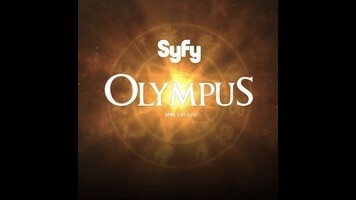With Olympus, Syfy plays the game of thrones and loses

On paper, Olympus isn’t the worst idea for a fantasy series designed to ride the sword-and-sandals boom and pull in some small but profitable fraction of the Game Of Thrones audience. Set in 2014 B.C., the Syfy series created by network staple Nick Willing bypasses the creation of its own mythology by going straight to the source and incorporating Greek gods and monsters into its narrative. These Greek myths have stood the test of time, but it remains to be seen whether they can survive one of the shoddiest fantasy productions in recent memory.
Tom York stars as our hero, known as Hero in the credits and never called by his true name because those who speak it aloud turn to stone. In practice this means everyone in the premiere episode, “The Temple Of Gaia,” refers to him as “the mercenary” or “the marshal” or “you there,” which is just the first of many missteps in this initial hour. Creating identification with a lead character is crucial, and hard enough to pull off without adding to the degree of difficulty by not giving him a name. (York’s colorless, instantly forgettable performance doesn’t help much either.)
When we meet Hero, he’s trapped in a cave, prisoner of the fearsome Cyclops. To its credit, Olympus doesn’t go for the standard-issue one-eyed giant from a children’s illustrated book of Greek myths. This Cyclops is a blue-ish beastie covered in pink pustules, with a single eyeball fixed in the middle of its mouth. It’s a gruesome enough creation, but the first question that springs to mind when it appears is, “How does this poor sucker eat?”
Hero escapes the Cyclops and continues his mission, which is to retrieve the escaped Oracle (Sonya Cassidy) and bring her back to the Temple Of Gaia. Although he encounters obstacles along the way, including two decoy Oracles and a pair of wild boys (one of whom turns out to be the Oracle’s brother Theo) who ambush him on the road, all of them are easily overcome thanks to his mastery of rope tricks. The Oracle escapes Hero at least twice only to be immediately recaptured. In one scene, the Oracle and Theo fool Hero by making a circle of footprints to conceal their true destination; in the next scene, with no explanation, he’s found them in the forest. It’s as if Olympus can’t be bothered with the most rudimentary attempt at crafting suspense or even basic storytelling.
Back in Athens, King Aegeus (Graham Shiels) is frustrated with his army’s efforts against the superior forces of King Minos. “No more cowardly schemes to hide men inside wooden horses! I need something bold!” He and wife Queen Medea (Sonita Henry) seek to harness the power of the Lexicon, the “riddle of the gods” that allows humans entry to Olympus. Medea believes this secret lies within her son Lykos (Wayne Burns), but the prophecies he offers up are largely worthless. Meanwhile, some of Aegeus’ trusted advisors, including his brother Pallas (John Emmet Tracy), are plotting against him.
When Hero gets the Oracle back to the temple, it turns out he isn’t on any great mission or quest; he simply has a personal question to ask her. (She informs him that he could have asked her at any time and needn’t have bothered dragging her all the way to the temple, but what’s done is done.) “Why was I brought up in hiding?” The answer: He is the bastard son of King Aegeus, and the Lexicon lies within him.
Nick Willing has made at least half a career out of directing re-imagined versions of classic fantasy tales for Syfy, including Alice, Neverland, and Tin Man, a steampunk-flavored take on The Wizard Of Oz. None of these are fondly remembered masterpieces, but they at least achieved a basic level of competence and a modicum of cleverness in conception. The same can’t be said for Olympus, the entire cost of which probably doesn’t add up to the horse feed budget on Game Of Thrones. Penny-pinching is nothing new when it comes to Syfy productions, but when you’re trying to create an entire fantasy world from scratch, the limitations are painfully apparent. The major battle in the first episode involves roughly a half-dozen combatants clanging swords on a digital wall. The city of Athens as a whole is weirdly underpopulated, which only adds to the unreality of the CG environments.
It’s a given that any large-scale fantasy production these days is going to involve tons of green-screen work, but that’s never been so obvious as it is here. Some of the designs are promising, such as the giant crumbled statues that litter the landscape, but put the actors in front of them and they appear to be exactly what they are: backdrops, with no sense of depth or immersion. The whole production is airless and stagy; the sound design is so bad, you can hear the actors’ voices echoing off the sound stage walls. Olympus evokes the unreality of a high school play, but it isn’t going for campy laughs like the Sharknado movies. Good acting and strong writing might help it overcome its very visible flaws, but neither is in abundance in the premiere episode. Maybe Olympus will stumble upon a workable tone at some point; for now, it’s just another poor reproduction of something that will be back on your television soon enough anyway.